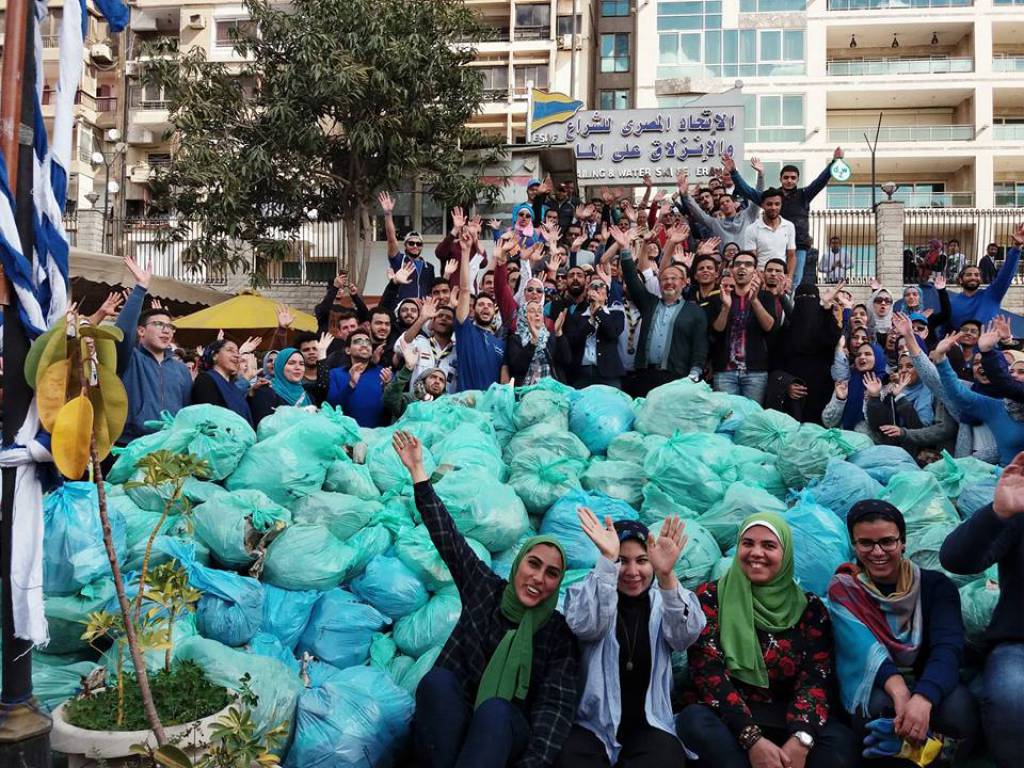
With increasing community awareness of the dangers of plastic to human and environmental health, a number of youth initiatives in Egypt have been launched to tackle plastic pollution, notably Banlastic, Bekia and Verynile.
Verynile was established in December 2018 by Greenish, a green social enterprise, and Basita, a marketing, advertising and video production company, with the goal of removing plastic waste from the River Nile and Egyptian beaches, raising public awareness of its hazards and offering suitable alternatives.
Egypt ranks seventh on the list of the world’s largest exporters of plastic waste, which finds its way into seas, oceans and other water bodies. Marine plastic waste in Egypt ranges from 0.15 to 0.39 million tons per year, according to a recent study published in the Scientific American.
Saif al-Ashkar, communications officer at Verynile, told Fanack, “Plastic pollution is one of multiple environmental problems because plastic waste takes hundreds of years to decompose, and it accumulates around us, especially in rivers and seas, threatening the lives of organisms suffocated by ingesting plastic waste. Moreover, plastic waste breaks down into tiny parts known as microplastics, which are digested by fish and eventually reach humans through the food chain.”
The burning of plastic waste releases certain carcinogenic chemicals such as dioxin, a toxic substance that accumulates in the human body when inhaled. It can also be transmitted from mother to foetus through the placenta.
Verynile has organized four cleaning campaigns so far, targeting the banks of the Nile in the Cairo areas of al-Ajuzah, al-Manyal and Zamalek in cooperation with the Egyptian Rowing Club, as well as a campaign in Luxor Governorate. Al-Ashkar said that the campaigns resulted in the collection of about eight tons of waste, which were sent to GoClean for recycling and appropriate disposal.
Egypt consumes around 12 billion Egyptian pounds of plastic bags annually, and the plastics industry involves all sectors including packaging, pipes, household appliances, spare parts and engineering tools. Investment in plastics is also significant, amounting to $702 billion annually, according to Khaled Abu al-Makram, head of the Plastics Division at the Federation of Egyptian Industries.
In response to the global call to ‘beat plastic pollution’ launched on World Environment Day on 5 June 2018, the Ministry of Environment unveiled its own a initiative to reduce plastic consumption. Some places have already stopped consuming plastics, including the Red Sea Governorate and the city of Dahab in North Sinai Governorate.

In June 2019, Member of Parliament Anissa Hassouna submitted a petition to the cabinet and the ministers of environment, foreign trade and industry to ban the use of plastic bags in Egypt and replace them with environmentally friendly alternatives.
“Egypt’s steps to fight plastic are positive and optimistic, and we expect that decisive decisions will soon be made regarding plastic consumption across Egypt,” said al-Ashkar.
He noted that Verynile’s work is not limited to cleaning campaigns but extends to initiatives in schools, universities and companies to rationalize plastic consumption, raise awareness of its damage and find suitable and eco-friendly alternatives.
“We follow up on the places we clean and notice that they become filled with waste again due to the continuing consumption of plastic and because the waves throw waste onto the beach. Therefore, cleaning and recycling campaigns are not the final solution, and we need wise consumption and the use of reusable plastics or substitutes made of paper, cloth or glass, which are available, not expensive and safe for public health and the environment.”
For its cleaning campaigns, Verynile identifies the places with the worst plastic pollution, then puts out a call for volunteers online. Each campaign involves around 300 volunteers, who are provided with biodegradable waste collection bags, fishing nets, gloves, boots and other cleaning and safety equipment.
Verynile is now looking for sponsors to cover the costs of the campaigns and is in talks with the water police to improve the process of obtaining cleaning licences. Several public figures have attached their name to the initiative, such as actor Karim Qasem and actor Ahmed Magdi, which al-Ashkar hopes will encourage sponsorship.
“We have a long waiting list of volunteers, which will enable us to carry out more campaigns, but we lack the funding to be able to cope with the demand,” he said.
In addition, Verynile is hoping to establish an alliance of environmental organizations that can take on larger initiatives.
“We have a plan to make Zamalek a plastic-free area within a year,” said al-Ashkar. “Our volunteers go down two days a week to talk to shopkeepers and convince them to stop using plastic and use cloth and paper materials instead. They say that the response has been very good.”
The next cleaning campaign, called ‘No more plastic’, will target the governorates of Luxor, Minya, Sharm al-Sheikh, Alexandria and al-Qusayr.
“We focused on the capital in the past, and we intend to expand in other governorates in the coming period,” said al-Ashkar. “We will train initiative leaders and associations concerned with the environment in these governorates on how to organize cleaning campaigns without our support, so that we will not have to travel. This is because travelling is costly and because we want to ensure that the campaigns take place at least once a month.”


